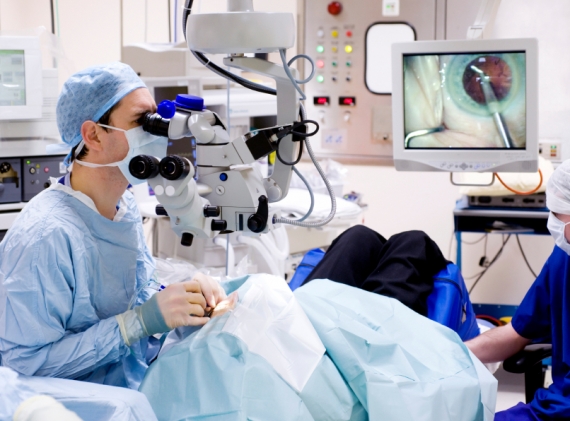Cataract Doctor in Cape Coral
If you have trouble reading, seeing in the distance, or difficulty with night vision, you may have a cataract. Cataracts are an inevitable part of the aging process. If you are looking for an experienced cataract doctor, Elmquist Eye Group in Cape Coral and Fort Myers offers the latest options in cataract treatment and lens technology.
 Elmquist Eye Group has been serving Lee County and Southwest Florida for more than 20 years. E. Trevor Elmquist, DO, and his partner, Kate Wagner, OD and associate, Nina Burt, OD, provide a wide range of eye care services, from routine eye exams for glasses to bladeless laser-assisted cataract surgery.
Elmquist Eye Group has been serving Lee County and Southwest Florida for more than 20 years. E. Trevor Elmquist, DO, and his partner, Kate Wagner, OD and associate, Nina Burt, OD, provide a wide range of eye care services, from routine eye exams for glasses to bladeless laser-assisted cataract surgery.
Dr. Elmquist is board certified by the American Board of Ophthalmology and a fellow of the American Academy of Ophthalmology. He specializes in general ophthalmology and cataract surgery, and has been selected as one of America’s Top Doctors in ophthalmology by Castle Connolly Medical Ltd.
If you find that your eyesight is making it difficult to enjoy your everyday activities, it’s time to discuss cataracts and cataract surgery with Dr. Elmquist.
Frequently Asked Questions about Cataracts
- What is a cataract? A cataract is the clouding of the normally clear lens in your eye. The cloudiness makes it difficult for light to pass through the lens to the retina and results in distorted or blurred vision, glare, or difficulty seeing in poor lighting conditions.
- What causes cataracts? The most common cause of cataracts is aging, and over 24.5 million Americans aged 40 and older are affected by them. However, cataracts can also be caused by a traumatic eye injury, by excessive exposure to ultraviolet light, by the use of some medications, such as prednisone and corticosteroids, and by certain diseases, such as diabetes. Cataracts worsen slowly over time, but cataract surgery can correct the problem.
- Can cataracts be prevented? No studies have proven that cataracts can be entirely prevented. However, making some lifestyle changes may help delay their onset or slow their progression, such as:
- Managing health problems such as diabetes which is known to increase the risk of cataracts.
- Protecting your eyes from exposure to UV sunlight, known to contribute to cataracts even in younger patients, by wearing 100% UV blocking sunglasses.
- Quitting smoking, because research suggests that smoking increases your chances of developing cataracts.
- Reducing alcohol intake, as excessive alcohol consumption can increase your chances of developing cataracts.
- Managing weight problems and eating plenty of fruits and vegetables and foods high in antioxidants, such as beta-carotene, selenium, and vitamins C and E, may slow the development of cataracts.
- Getting regular eye exams can help detect cataracts in their early stages.
- How are cataracts treated? Cataracts can only be treated with surgery to replace the clouded lens of the eye. The natural lens is replaced with an artificial lens. There is little to no discomfort, and vision is usually restored within days. Although all surgeries have risks, cataract surgery is one of the safest surgeries performed in the U.S. today. And Elmquist Eye Group now offers bladeless laser-assisted cataract surgery which is designed to make the procedure even more precise, safe and accurate.
Schedule an appointment today with an experienced eye doctor to find out if your vision problems are related to a cataract, glaucoma, macular degeneration, or another condition. If you live in Cape Coral, Fort Myers, or elsewhere in Lee County, call Elmquist Eye Group at (239) 936-2020 to learn about your treatment options.
